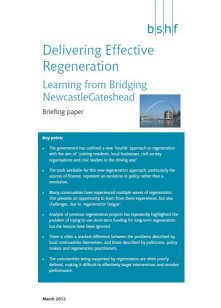
This research briefing outlines key learnings for regeneration policymakers and practitioners, with a particular focus on the Housing Market Renewal Pathfinder, Bridging NewcastleGateshead, which ran from 2003 to 2011 in the North East of England.
Drawing on interviews with local communities affected by regeneration as well as practitioners, the briefing highlights key factors for successful regeneration. By learning from the positive and negative aspects of previous regeneration, policymakers and practitioners can develop approaches that most benefit the communities with which they work.
This is particularly important as the government is seeking to promote a new localist approach, which places a greater emphasis on the role of local communities in regeneration.
Particular findings of the research include:
- The importance of a long-term commitment to funding regeneration at a national level, preferably with some level of cross-party support
- The need for the government to clarify what will happen if the priorities of local communities conflict with those of national policymakers
- The need for a clear definition of the community being supported by regeneration
- The importance of understanding and addressing the needs and aspirations of the communities affected by regeneration
The research was conducted by Andrea Armstrong during a PhD at Durham University, which was supported by BSHF. The work was summarised into this research briefing by Ben Pattison.



Join the discussion